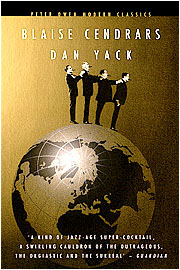An infinite sadness took hold of him

Dan Yack
by Blaise Cendrars
translated from French by Nina Rootes
Probably the most serendipitous book find of my life was in the Oxford branch of Blackwells Bookshop about eight years ago. From their bargain bins I randomly picked up a book I had never heard of by an author I had never heard of and I completely loved it; in fact it’s one of my top three or four books ever. That book was The Confessions of Dan Yack by Blaise Cendrars, which is actually the second book about Dan Yack, so for years I had been intending to read this earlier novel but somehow it just sat there on the TBR.
This is a stunning piece of writing. If everything was written this way I would probably find it frustrating but in this case it works. It blends the poetic and the banal, even baseness. A couple of pages might include high adventure, stream of consciousness, erotica, boredom, detailed descriptions of settings and switch between multiple points of view.
“The Neva flowed past at eye-level. The rushing current swept the timber-barges down at full speed; crouched and menacing, they ploughed through the close-packed waves that were ruffled up the wrong way by the harsh wind of dawn. Sudden shivers rippled the wet fur of the river as it stretched itself nervously and arched its back.”
In its 130 pages we follow multi-millionaire playboy Dan Yack from St Petersburg to Liverpool to the Antarctic to Chile. Yack is an eccentric and initially appears frivolous and unthinking but gradually reveals both good business sense and a good heart. However, I never did completely warm to him – the combination of seal hunting and his never having read a book didn’t exactly make him my ideal hero – but I was certainly intrigued.
“Dan Yack suddenly fell silent. He felt uneasy again. His legs sagged. He was overwhelmed by fatigue. An infinite sadness took hold of him, drained him, blew him up again, oppressed him.”
I suppose you might call this a Modernist take on the adventure novel. The bulk of the story centres around Yack deciding to treat his heartbreak by spending a winter in the Antarctic. On a whim he invites three impoverished artists he meets at the end of a long drunken night of debauchery to join him.
I suppose one of the attractions for me of this book was the Antarctic setting. Cendrars ran away to sea as a teenager so he was almost certainly writing from true experience of the endless days turning into endless nights. Certainly that section had many of the same details and much of the same unease, even terror, of other books I have read with an Antarctic setting.
“Nine times out of ten, the weather was overcast, but when it was not, the night outside was like a fairyland. The icy cold was always intoxicating…sometimes, there is an austral dawn that shakes out its crackling draperies at the level of the ice; it is yellow, green, shot with fugitive gleams and punch-flames.”
The storyline is incredible, in a literal sense, but that’s almost beside the point. Cendrars unveils the human psyche, the revelation is what truly matters to Yack, not what happens to him. But while that sounds terribly serious, the book is actually a lot of fun, with an odd sense of humour, or at least a sense of the ridiculous.
“Deene had to wait a while before he could get a word in because a little nasal phonograph was filling the narrow cabin with a young, charmingly artificial female voice. Dan Yack swore it was a buxom little blonde, wiggling her hips as she sang…
‘Sir,’ the captain began determinedly, ‘I—’
‘Wait,’ said Dan Yack, ‘let me change the cylinder. It’s amazing…Can you see the old tart who’s singing now, Captain?…The sweat’s rolling down from under her ridiculous wig…She’s wearing thick blue stockings with garters at the knee, I adore that! What a marvellous invention!…Wait a minute, I’m going to have you listen to the cries of a sea-lion that’s having its throat cut.'”
While Modernist, this is certainly not an especially modern story. It is full of sexism and racism, not to mention the hunting (Yack’s family fortune is largely based on whale hunting). And yet I loved it. I was utterly spellbound. Huge credit must go to the translator here because every sentence was perfect. I quickly gave up picking out quotes because every line is quotable.
“Outside the storm raged. A sheet of corrugated iron was ripped from the roof. Then a pile of barrels came crashing against the door. The wind besieged the house.
It raged for many days and nights.
The first blizzard.
A white-out.
Winter.”
Apparently Cendrars was one of the founders of, the pioneers, of Modernism and it seems a shame that he is not read widely. I seriously must not wait another eight years to pick up the other Cendrars title on my TBR.
First published 1927 by Editions Denoël. This translation published 1987 by Peter Owen.
Source: I bought this secondhand, probably via Abe Books.
Challenges: This counts toward the 2013 Translation Challenge and the 2013 TBR Pile Challenge.